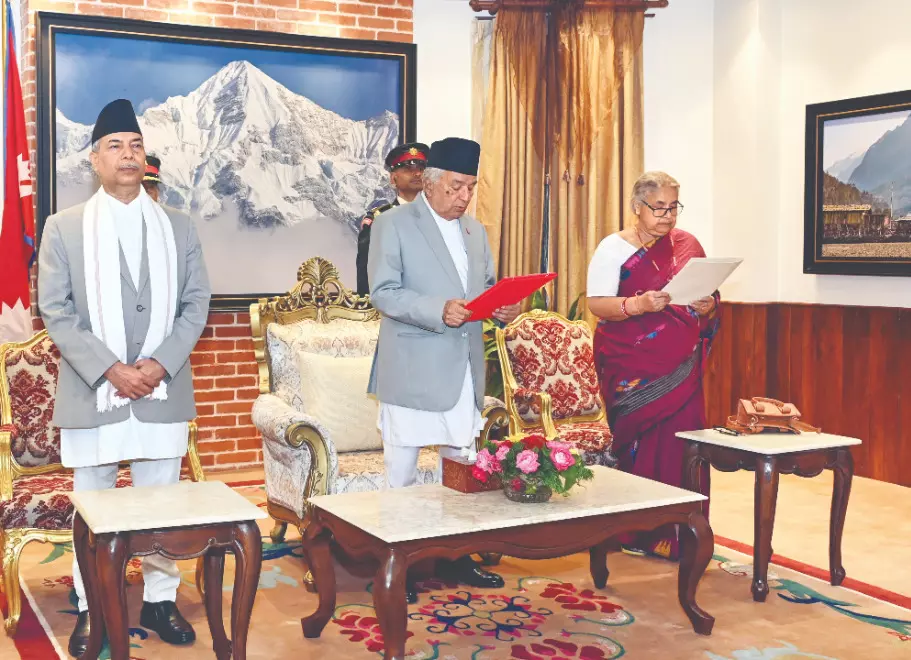
Kathmandu/New Delhi, Sept. 12 -- Nepal's political landscape turned historic on Friday as former Chief Justice Sushila Karki was sworn in as the country's first woman prime minister. The 73-year-old leader has been tasked with steering a six-month interim administration, following the dramatic resignation of former Prime Minister K P Sharma Oli earlier this week amid mass protests led by young demonstrators.
The oath of office was administered by President Ramchandra Paudel at the President's Office in Kathmandu. The ceremony was attended by Vice President Ram Sahay Yadav and Chief Justice Prakash Man Singh Rawat, who stood witness as the Himalayan nation entered a new political chapter.
"Within six months, the government must conduct elections to restore stability," President Paudel said, underlining the immediate responsibility of the caretaker administration.
Karki's appointment followed intense consultations among the presidency, military leadership, and youth protesters at the forefront of the movement that forced Oli from office. A late-night meeting between President Paudel, Nepal Army chief Prabhu Ram Sharma, and representatives of the "Gen Z" protest movement produced consensus on Karki's leadership.
Soon after taking the oath, Karki was expected to form a lean cabinet. Sources indicated that the new cabinet's first act may be to recommend the dissolution of Parliament, in line with an agreement reached among stakeholders during the transition talks. Before finalising Karki's name, the President held separate rounds of dialogue with leaders of major political parties, civil society figures, and constitutional experts. The move reflects efforts to build broad legitimacy for a government shaped by both street power and institutional consultations.
Former Prime Minister Oli stepped down on Tuesday after youth-led demonstrations spiralled into deadly violence. The protesters demanded sweeping reforms, including an end to corruption, the curbing of nepotism, and the lifting of restrictions on social media platforms. The ban on several platforms, imposed earlier this year, was revoked on Monday night.
Parliamentary leaders also weighed in before Karki's swearing-in. Speaker of the House of Representatives Devaraj Ghimire and National Assembly Chairman Narayan Dahal issued a joint statement calling for resolution of the political impasse "within the framework of the Constitution." "The rule of law and constitutionalism must not be bypassed," they said, urging that the demands of protesters be addressed while safeguarding democratic institutions.
The protests, which escalated over the past week, have exacted a heavy toll. At least 51 people were killed, according to police records, including an Indian national and three Nepalese policemen. Nearly 1,700 others sustained injuries.
Senior Superintendent of Police Ramesh Thapa, spokesperson for Nepal Police, confirmed the fatalities, noting that one of the victims was Rajesh Devi Gola, a 55-year-old woman from Ghaziabad, Uttar Pradesh. She died on Tuesday after attempting to escape from a burning hotel in Kathmandu. Her husband, Ramveer Singh Saini, survived by leaping out of a window.
At least 36 bodies were taken to Tribhuvan University Teaching Hospital, where post-mortems began Friday. Reports said 19 demonstrators, mostly students, were shot dead outside the Parliament building on Monday, while others were killed during clashes across the country. Three policemen were lynched by a mob in Kathmandu's Koteshwor area the same day. Many of the deceased were cremated on Friday at Aryaghat, near the sacred Pashupatinath Temple by the Bagmati River, as grieving families and relatives gathered under heavy security presence.
The Army stepped in to restore order after the government collapsed. Prohibitory orders were first issued earlier in the week and later extended in Kathmandu Valley's three districts, though authorities permitted limited public movement during designated hours. Police stations and posts damaged by mobs have begun resuming operations as calm slowly returns to the capital.
Nepal's hotel and tourism industry has been devastated by the unrest. The Hotel Association Nepal (HAN) said on Friday that losses had exceeded 25 billion Nepalese rupees after nearly two dozen hotels were torched, looted, or vandalised.
The Hilton Hotel in Kathmandu was among the worst hit, reporting damages of over 8 billion rupees, according to a statement published by HAN and quoted by My Republica. The destruction threatens a key revenue stream for the country's economy, which heavily depends on tourism. As Nepal grapples with the crisis, immigration authorities announced temporary relaxations for stranded foreign visitors. International travellers whose visas expired on or before September 8 can obtain exit permits without incurring penalties, officials told The Himalayan Times.
Published by HT Digital Content Services with permission from Millennium Post.
